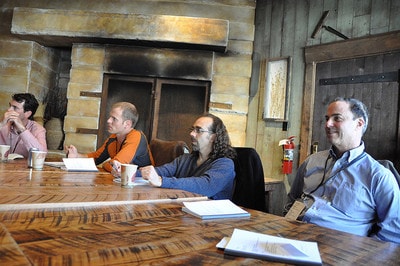Welcome back to the Positive Power series. Here’s part 3 at the team and organization level of “WE”. Let’s see what interactions you see happening around you. Otto Scharmer discerns four levels of conversation in organizations.
Downloading
People are talking nice, they are polite. They reenact the rules of conversation. They “download” a conversation format. They hear what they expect which confirms their views. Attention is “I in me”. People confirm their beliefs, maybe even prejudice, and focus on their position.
This happens when people don’t speak their mind and say “yes” while they mean “no or maybe.” They conform to the dominant group culture. “Silence” is a way to fit in and be safe, even when you don’t completely agree. This is not the way of the positive agent who is looking to contribute to positive change. This is a role-play.
Discussion or Debate
People are talking tough and this can reveal the rules of this relationship or team. They listen to facts. Attention is “I and it”: looking out at information and possible opponents.
Although there’s nothing wrong with a healthy, critical discussion to improve ideas, Scharmer refers to a debate to win the argument. Egos speak and focus on differences and winning and losing. The participants identify with their points of view and take it personally if someone debates their idea. Dominant views may be pushed, other views may be ridiculed. Differences and rules are revealed: Who is the boss? Who gets airtime? What gets buy-in?
Debate shows more energy and awareness than Downloading and is more creative but the way it is done (from Egos, agendas, and through verbal fights) does not create a safe space to learn, to be authentic, to amplify the positive and collaborate.
Debate is also biased toward extroverts. “Violence” (pushing your opinions and logic) is a way to conform to the group norm. This is not the way to reach constructive engagement as positive agents would like.
Dialogue
People are asking genuine questions and reflect on the rules. They listen with empathy and focus on the other as a person. Attention is “I in You”: taking others’ positions and feelings into account.
This is a constructive conversation based on equality and respect. It departs from a true interest in others’ viewpoints and inquiry. “How come…?” Rules are reflected upon. Thinking out-loud together occurs. Everyone contributes equally to “the pool of meaning in the middle” and builds on what the others say – instead of opposing.
The participants don’t identify with their points of view. They do not take it personally if others don’t adopt their idea: it is just an idea not their identity.
Information starts to flow and a collective intelligence emerges. We’re looking for common intent and goals, shared meanings and emerging actions that the group will take ownership of. This is the way to reach true consensus: if people say “yes” they mean it and commit themselves. This is what we try to accomplish as positive agents but it requires mature participants with a willingness to open up and let go of fears, prejudice and old habits.
Presencing
This is an advanced stage where collective creativity and flow emerges. New rules come into existence. People listen to one another and build on what happens. Attention is “I in the Now”: what tries to emerge from this collective field of attention? Everyone heeds the signals in the here and now and is so engaged in the process that they forget themselves. This is also a characteristic of Flow as described by the psychologist Mihály Csíkszentmihályi.
Which kind of conversations do you hear and see in your organization? How could you contribute to dialogue?
This is book post #65 – Part “WE”
For more insights and advice, order my book Developing a Positive Culture
Check out the online Positive Culture Academy. Let’s be Positive Agents who do revolution by evolution: one interaction at a time, one person at a time. Subscribe to the Academy’s mailing list so I can keep you posted!
Here’s the earlier post
Here‘s the next post
If you’re confused, check the Positive Power overview and read the Positive Agent Manifesto.
By the way, if you want to contribute to a positive workplace culture, my next open workshop on Positive Culture Change Leadership is scheduled for September 2018! More information and registration is only a mouse click away.
© Copyright Marcella Bremer, 2018. All rights reserved.
